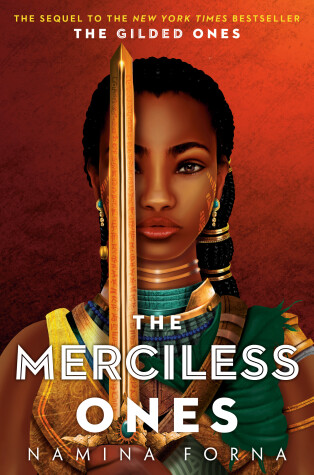While The Gilded Ones ended on a hopeful note, The Merciless Ones starts off with the corpses of four young women mounted on pikes.
It’s set 6 months after the goddesses were freed by Deka and focuses on the backlash by the jatu, who now seem to be more powerful than ever after get their hands on some arcane objects. Deka, as the Nuru, the child of the four goddesses fights against these priests while dealing with her own PTSD. She is joined by her bloodsisters, and as they stick together they realise there is something more sinister at play. As they grow in strength they understand that gods can also be created through the power of human belief.
In that sense there is a lot to love about the sequel. The idea that gods can be created or at least powered through prayer or belief is a powerful one to say the least. It’s also incredibly relevant in the world that Namina Forna has created in the book, as well as the world we live in today where we know we’ll need to radically change how we live and what we believe in if we want the planet to survive or to ensure that we have rights over the self.
The book also challenges the sexist belief that just because women are in charge it’s a utopia. It’s absolutely more about the way we wield power than who wields power that matters; not just your gender. It is also an important lesson on how we make ideals of our gods and heroes, and ignore all the wrong that they have done or are continuing to do so.
It’s also great to see how there were so many jatu and alaki. It really adds a really great dimension to the book, not just in terms of the plot, but a commentary on how so many of us are so different, that it’s actually most of us.
I liked that Deka grew as a character and constantly tried to be the right sort of hero and role model, but that she was human and needed help. I love her relationship with Keita and I think Namina Forna put in some really positive themes in their relationship, like how he spok to her about how she couldn’t shut him out in situations. That being said, most of her friends blurred into one and didn’t stand out to me. Britta, of course, is always by her side, but I didn’t particularly care for the thing with Li, and Britta as a whole was just a bit annoying to me.
My favourite characters in this book were easily White Hands, Elfriede and Anok. I think with White Hands that easy for everyone to understand; she’s badass, but the way Namina Forna depicted her in this was amazing. Like massive respect for Forna. I suppose it’s harder to explain why I like Elfriede. I like her as a character, but not as a person. But I also respect that she did what she could to survive. She collaborated with the existing system to become the first in her role, but even as she died, the priests still couldn’t stand her.
“This is another distraction,” she explains. “Another impossible aspiration to distract women from the misery of their lives. To make them dream, if only for a glittering moment, that they can be more. Clever. Insidious, but clever.”
I think this quote is emblematic of the greater problem of the book. While it’s a great quote that explains Elfriede’s role in this new society, and is well written, I think it’s moments like these that make the book more suited for slightly younger readers. An older reader may not need something like this spelled out for them.
I was also not a fan of how everything turns out perfectly okay for most people at the end. I think one particular character should have stayed dead. There was also this sense that Deka comes into her new powers too quickly. One of the reasons why the first book is interesting is because we see her working towards them; while in this book everything related to her abilities is like second nature to her. I didn’t care for all the happily ever after love stories, they just bored me!
While I didn’t love this book as much as the first one, I’m 100% going to be reading the third book because the world Namina Forna created is fantastic!
